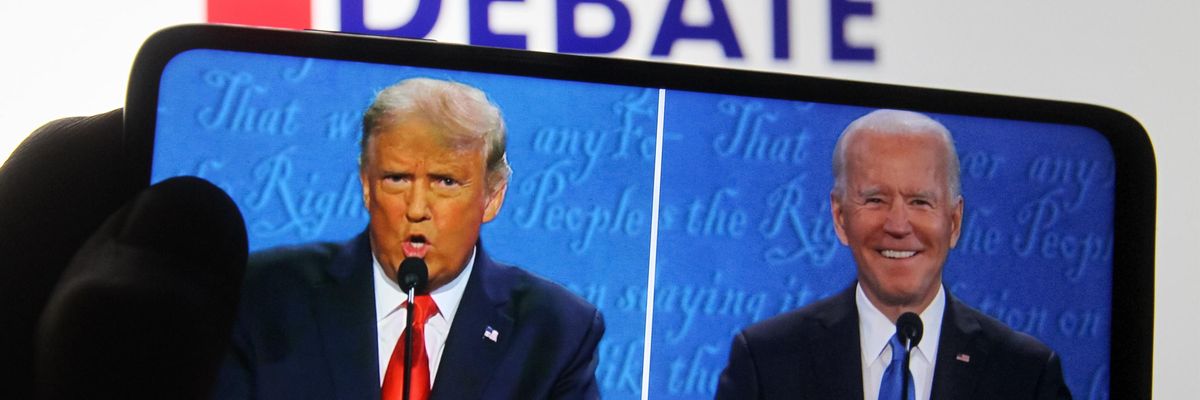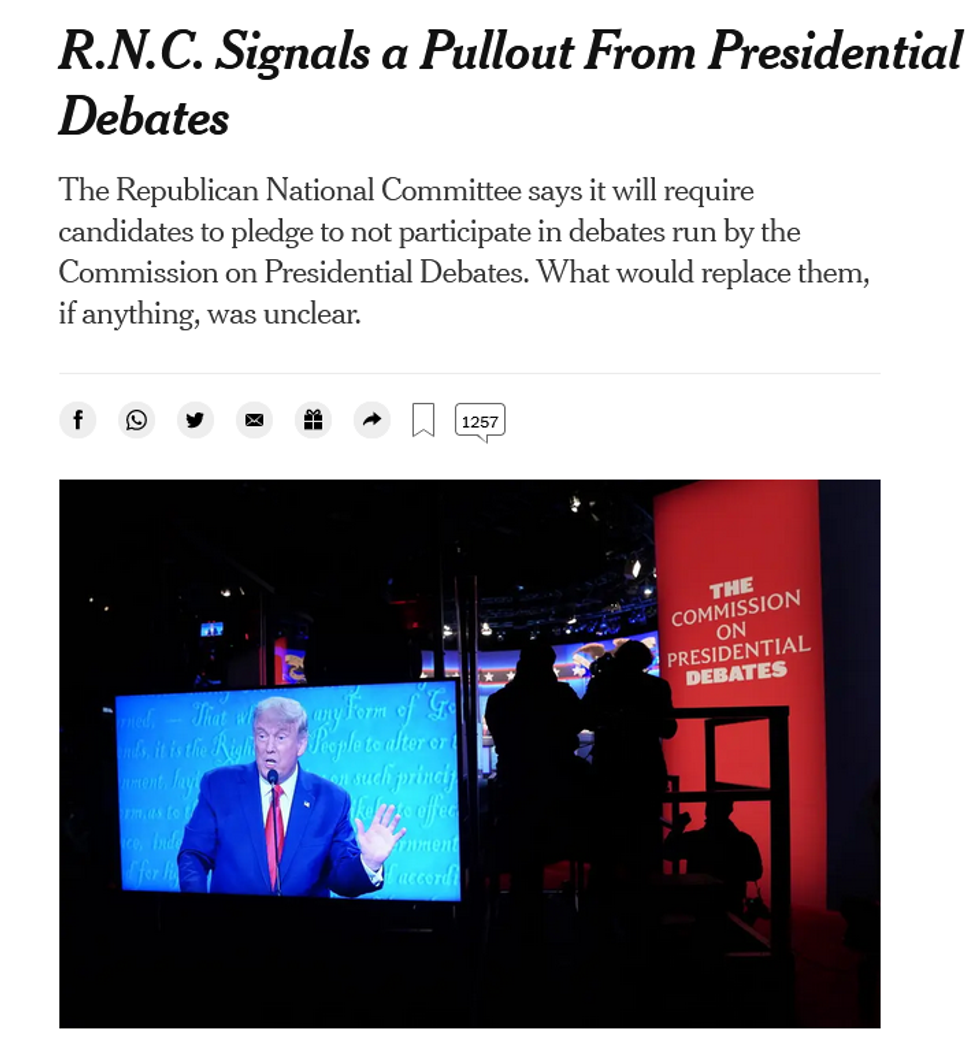The New York Times (1/13/21) reported that the Commission on Presidential Debates was "founded by the two parties in 1987 to codify the debates as a permanent part of presidential elections." But the League of Women Voters had run independent debates in the previous three election cycles.

The New York Times (1/13/21) broke the news that the Republican National Committee intends to require future GOP candidates for president to "sign a pledge not to not participate in any debates sponsored by the Commission on Presidential Debates."
We have also consistently criticized the CPD-approved debate moderators, chosen from prominent corporate media outlets, for the right-wing corporate framing of many of their questions.
It's not clear what this would mean for future presidential debates. The CPD has run general election presidential debates since wresting control of them from the League of Women Voters in the late 1980s. Characterized by the Times and other outlets as a "nonpartisan" group, the CPD in fact was created by the chair of the Republican National Committee himself, along with his Democratic counterpart (New York Times, 2/19/87). The point of the new group was to give the two major parties the power to exclude third party candidates (like Ross Perot and Ralph Nader), and to allow the Democratic and Republican parties, not the truly nonpartisan LWV, to set the rules (FAIR.org, 8/29/00).
FAIR has consistently criticized the news media, who continued to offer moderators and air the debates under the CPD's authority, for submissively allowing the two major parties to dictate the rules--including vetting the moderators (FAIR.org, 10/3/12, 8/26/16). We have also consistently criticized the CPD-approved debate moderators, chosen from prominent corporate media outlets, for the right-wing corporate framing of many of their questions (FAIR.org, 8/26/16, 8/2/19, 2/29/20, 10/2/20, 10/9/20).
One could reasonably ask whether this matters: Are presidential debates even useful anymore? After the disastrous 2020 debates, in which Donald Trump's refusal to follow any rules of debate (or decency), many pundits called for the CPD to allow moderators to simply cut participants' microphones. As we argued at that time (10/2/20):
Mike-cutting is no solution, given a media obsessed with the appearance of evenhandedness. By two different counts, Trump was responsible for more than three-quarters of the interruptions (Washington Post, 9/30/20; Slate, 9/30/20). A committed corporate journalist would cringe at the idea of cutting off one candidate three times as much as the other, no matter the facts of the case, but cutting them off equally would clearly be absurd.
The problem is not one that can be solved by new rules, because debates--from high school debate club to presidential debates--are predicated on certain assumptions: that each person has a right to be heard, that competing positions are put forth, that claims must be supported by logic and facts, and that debaters are not entitled to their own facts. When one candidate refuses to acknowledge or play by these rules, no amount of tweaking by the CPD will change the outcome.
And when you have a candidate--who also happens to be the sitting president--who will not respect the rules of debate, who deliberately casts doubt on the legitimacy of the election, and who issues directives to white supremacist groups from a national stage, the only reasonable thing for journalists to do is to not just call for an end to the debates, but to call for an end to the Trump presidency.
Now it's not just Trump that has abandoned such rules; nearly the entire GOP has thrown in with the authoritarian wing of the party. The corporate press have hardly been treating the GOP's hard shift to authoritarianism as the emergency it is (FAIR.org, 10/1/20), but they still largely traffic in facts that the GOP is working hard to deny and wall off their own voters from. It's hard to imagine the party being willing to face even the minimal real-time factchecking that debate moderators have occasionally offered. Recall that Trump threw a fit over Fox News' Chris Wallace being given a moderator slot in the 2020 debate (Vox, 9/29/20).
At the same time, the GOP resistance to a commission their own party helped form and continues to influence obviously sends a clear message about their willingness to engage with even a highly flawed version of democratic debate. While we shouldn't mourn the apparent end of the CPD debates, we must insist that our news media cover the GOP's unabating authoritarian push--not just on democratic debate, but voting rights, election security, the January 6 investigation, etc.--with the same level of relentlessness.


